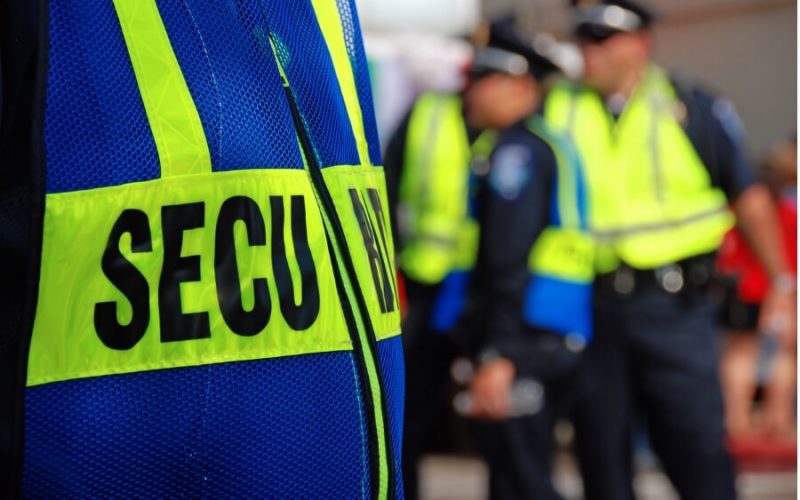When putting on corporate events, there are lots of things to consider. You need to have the perfect location with delicious catering and a great lineup of speakers and entertainers, so every attendant enjoys themselves. It’s no small feat to put on a large function, that’s for sure. While your goal is to provide the best event you can, more important is the safety and security of the event itself. There is an increased security threat when you have large corporate gatherings. While your company’s offices are locked and monitored, a venue in the public arena is more exposed. How do you plan to ensure the safety of your guests? Here are five tips on how to increase security at corporate events.
#1. Hire a Professional Security Company
If you want to maintain privacy at your event, you need to keep it secure. The best way to do this is by hiring a security company. Security guards posted at all entry points, as well as patrolling inside, will keep everyone safe.
Using security guards is the best way to have a successful, safe event. You may not have considered all the decisions that must be made to secure your venue and keep attendees safe from harm. A professional security company has the manpower and know-how to protect your events. These professionals are fully trained in a security guard training course, making them efficient and reliable at corporate events.
You can have uniformed guards and plain-clothed personnel walking around the venue. Having a visual presence at the main entrance is ideal for unwanted guests.
#2. Don’t Advertise Private Events
Most corporate events are private and should stay that way. Any publicity will only bring attention to the event and potentially attract protesters or intruders. You don’t want any agitators to disrupt your venue so try not to advertise publicly.
It can be tempting to promote your event on social media, but that is open for the whole world to see. You want to keep it private unless it is open to the public, so keep your communications to those who will be attending. Ask invitees not to publicly talk about the event until after it is over. This way, you can minimize the security threat.
#3. Control Access
This is one of the most important roles for a security team. You decide who you want to attend your event, and it’s up to the security team to enforce it. Based on the venue location, there may be several access points. Have a comprehensive security plan that can be implemented for the area.
You can use several methods to increase control, including passes and access cards. Facial recognition software can also be used, fingerprint scanners, and other tech security. At the very least, everyone should have credentials to get in, and a guest list at the door will be useful. Ultimately, you want only to grant access to those invited, so take whatever measures are necessary.
#4. Use the Venue’s Security Plan
Some event spaces have security protocols and measure to help protect those who book the space. This shouldn’t negate the need for your security but rather enhance it.
Check with the venue manager about their safety plans. They may have security in the building and have a plan for emergencies. Ask if they have safe rooms and private emergency exits that can be used in an attack. You need to be prepared for anything, and if your corporate event is high profile, you need added security measures to keep everyone safe. Consult with the venue staff for any potential weak points in their location. You can beef them up with your security team as necessary.
#5. Have an Emergency Plan
There is always the potential for an emergency. It could be unwanted guests or a larger threat like an active shooter. In any emergency, having a plan is vital. Communicate with the security staff about potential threats to your event. Together you can come up with a comprehensive plan for safety and evacuation. Consult with the venue as well as they can assist you.
Put together a threat scenario list and develop the appropriate responses. This will include:
- Muster points
- Mass evacuation plans
- Active shooters
- Communication during a crisis
- Medical emergencies
Have medical personal at the event on standby for medical issues. They can address any slip and fall injuries and heatstroke, overindulgence, and large-scale trauma if necessary.
It’s great to put on large corporate events. It brings together employees and management for a social experience you don’t get back at the office. Make sure you have a successful event by increasing the security. It will make things smoother and ensure all attendees are safe and have a great time. The best security is one you don’t even notice.
What resources are available for improving security at corporate events?
There are various resources available for improving security at corporate events, such as consulting firms, security technology companies, and industry associations. You can also conduct research online, attend industry conferences, or seek advice from other event professionals to learn more about the latest security solutions and best practices.
How can I incorporate safety and security into the event planning process?
Incorporating safety and security into the event planning process is crucial for ensuring a successful and secure corporate event. Consider conducting a risk assessment, working with security personnel to develop a comprehensive security plan, and ensuring all necessary measures are in place prior to the event.
What are the legal requirements for providing security at corporate events?
The legal requirements for providing security at corporate events vary by country and jurisdiction. It is important to consult with a legal professional and ensure that all necessary measures are in place to meet local regulations and laws.
How can I determine the right level of security for a corporate event?
The right level of security for a corporate event depends on a variety of factors, such as the size of the event, the type of attendees, and the location. Consider conducting a risk assessment and consulting with security personnel to determine the appropriate level of security for your event.
What training should security personnel receive for corporate events?
Security personnel should receive comprehensive training in order to effectively manage security at corporate events. This may include training in crowd control, emergency response, weapons screening, and privacy and confidentiality regulations.






